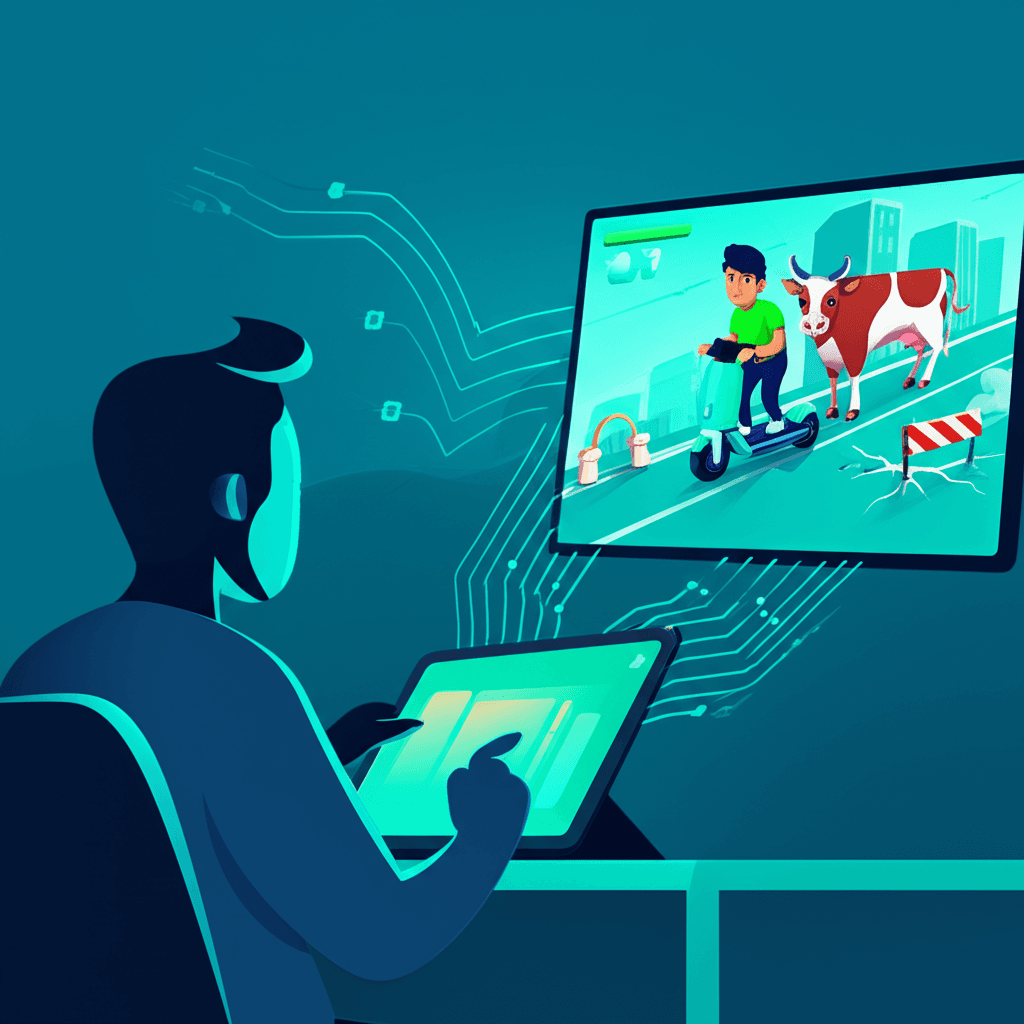AI Revolutionizes Game Development: Solo Creator Builds Hit Bengaluru App
A solo developer harnessed AI to turn Bengaluru's infamous commute chaos into a relatable and viral iPhone game.
July 9, 2025

A new iPhone game, "Mission Office," has captured the quintessential experience of commuting in Bengaluru, complete with the city's notorious potholes, stray cows, and sudden barricades. Developed by city-based software developer Harin Nitisvaar, the game humorously transforms the daily travel struggles into a playful, cartoon-style adventure. What makes this project particularly noteworthy is its creation process; Nitisvaar, who works at Zepto and has a background with companies like Swiggy and Dunzo, utilized artificial intelligence tools like ChatGPT extensively to bring his vision to life.[1][2] This innovative approach demonstrates the growing potential of AI to democratize game development, allowing solo creators to build and launch polished games without the need for large teams or substantial financial backing.[3] The game, born from Nitisvaar's own daily rides on his Ather electric scooter, has resonated with the public, finding a significant audience on social media who appreciate its relatability and humor.[1][2]
The inspiration for "Mission Office" stemmed directly from the developer's personal experiences navigating Bengaluru's chaotic streets.[2] The objective of the game is straightforward yet challenging: guide your character on a scooter to the office, dodging a gauntlet of obstacles that are all too familiar to the city's residents.[1] Players must skillfully avoid potholes that threaten to disrupt their journey, weave past leisurely cows that often wander into traffic, and navigate around unexpected barricades.[4] The game's setting is made more immersive through the inclusion of familiar city landmarks, adding a layer of authenticity to the cartoonish gameplay.[1][2] Nitisvaar’s choice to feature his own Ather scooter as the in-game vehicle adds a personal touch.[2] The project serves as a creative outlet for the shared frustrations of many urban commuters, turning daily annoyances into an engaging and entertaining interactive experience.[4] This transformation of a common problem into a creative product highlights a novel way for individuals to engage with and comment on their environment.
The development of "Mission Office" is a compelling case study in the power of generative AI for independent creators. Nitisvaar, without a formal background in game development, leaned heavily on ChatGPT as a coding assistant and for generating game assets.[3][4] The game was built using SwiftUI in Apple's Xcode development environment.[2][4] AI tools, including ChatGPT and the image generator DALL-E 3, were used to create the visual elements, which were then refined using Photoshop.[2][5] This method significantly streamlined the development process, allowing a single person to handle tasks that would traditionally require a team of specialists, including coders, animators, and designers.[3] ChatGPT, in particular, proved to be an invaluable partner, helping to simplify complex programming tasks, troubleshoot Swift syntax, and resolve bugs in real-time.[3] This AI-assisted workflow represents a significant shift in the landscape of game creation, making it more accessible to individuals with creative ideas but limited resources or formal training.[2] The ability to generate code, animations, and other assets through AI prompts lowers the barrier to entry and empowers a new wave of indie developers.[3]
The release of "Mission Office" on the iOS App Store has been met with positive reception, particularly on social media platforms like X.[1][2] Users have praised the game for its accurate and humorous depiction of the Bengaluru commute.[2][5] The relatability of dodging potholes and cows has struck a chord, prompting a wave of suggestions from players for future updates.[1] Ideas from the community include adding the city's ubiquitous auto-rickshaws, incorporating local language dialogues, and, most notably, introducing challenges like traffic jams and urban flooding.[1][2] Nitisvaar has already announced plans for a version 2.0 that will include these very features, promising an even more authentic, if frustrating, simulation of the city's travel woes.[2] He has also indicated the possibility of customizing player avatars and vehicles in future iterations.[1] While currently exclusive to the iPhone, the game's popularity has raised questions about a potential Android release, although no plans have been announced.[1][2] The success of "Mission Office" not only offers a lighthearted take on a common urban problem but also serves as a powerful illustration of how AI is reshaping creative industries, enabling individual developers to compete and innovate.[3][6]